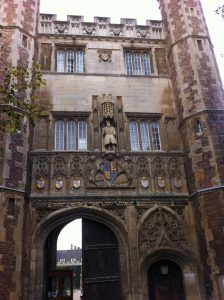Romsey Liberal Democrats - find us at http://www.cambridgelibdems.org.uk/romsey
We have moved our website to http://www.cambridgelibdems.org.uk/romsey and will soon be deleting this site. Learn more
Can previous Brexits teach us anything?
by Paul Saunders on 14 October, 2016

Henry VIII looks down at Trinity
Some thoughts from a historical perspective by former Romsey Councillor Catherine Smart …
I regret the Brexit vote along with most of the 48% but also think it might be helpful to look at previous occasions when Britain parted with continental Europe – previous Brexits.
The most striking is the break from Rome – the Reformation – when England and Scotland (separately but in parallel) ceased to acknowledge the authority of the Pope. This had aspects other than governance and took different courses in different parts of the British Isles, but to stick to the question of governance, I think there are three useful pointers.
Firstly, Henry VIII and his government saw a financial advantage in the break and rapidly turned to realise it with the dissolution of the monasteries. It was assumed that large sums of money were leaking away to Rome but they ignored the part played by the monasteries in such things as education and poor relief.
The Leave campaign likewise spoke of large sums of money going to Brussels – and ignored the amounts that came back in grants and subsidies. The common agricultural policy takes up the largest part of the Brussels budget and, just as money was redirected in the16th century, Brexit could be an opportunity to fundamentally reconsider the purpose and value of the agricultural subsidies, as the National Trust, among others, is proposing.
Secondly the 16th century Brexit saw a shift in the education system so that young people could gain the skills deemed necessary for the new age. This was even more marked in Scotland than in England, but in both countries education, and especially literacy, rose up the agenda. There is a certain irony in Teresa May’s call for a return to grammar schools when many of the oldest English grammar schools were founded as a result of this 16th century Brexit.
That we check that we are giving our young people the opportunity to gain the skills they will need for a new situation is obviously sensible. That we should hark back to a previous age and very different circumstances, is just foolish.
The third lesson of the16th century Brexit is a darker one. It is easy to slip into paranoia and violence against the outsider. In the 16th century, this was very much the case, and mob violence against foreigners and others perceived as outsiders, was common.
Since the 23rd June, the increase in hate crime has been noticeable, and it is likely we don’t know the half. The murder of an individual for no reason other than he was “speaking foreign” is a chilling reminder of how easy it is for groups to turn on those perceived to be outsiders. Any politician fanning this flame bears a heavy responsibility. We must all make every effort to combat xenophobia and make it clear that demonising “the other” is not the way to go.
One final thought – what are the lessons of what might be called The Great Brexit – when the north-sea was formed and a surge of some kind first swept through the Straits of Dover?
The land was flooded but the British Isles did not leave the European continental shelf. We are still part of Europe. Our climate and our weather is still heavily influenced by our position as part of that continent – and migrating birds will see no change from Brexit!
In spite of the wilder ideas of some of the Leave campaigners, we will still need to work with our neighbours if we are to combat pollution, climate change and the loss of bio-diversity.
We cannot deny our geography – and it would be sensible to learn from our history.
Leave a comment
Leave a Reply